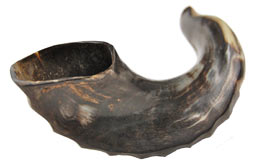By Sharon Murra-Kapon/feature editor
 L’Shana Tova! (For a good year!)
L’Shana Tova! (For a good year!)
The Jewish New Year starts at sunset today.
The Day of Remembrance or the Day of Sounding the Shofar (musical instrument made of a ram’s horn) is known as Rosh Hashana (head of the year), the first day of the year in the Hebrew calendar.
At the beginning of this special and one of the most important holidays, Jewish people spend time doing a spiritual inventory for the next eight days.
It is an opportunity to fix problems with family, friends and self before the Day of Atonement or forgiveness.
Rosh Hashana is almost like the first day of school; people feel excited and scared at the same time.
Everyone makes sure the alarm is set for that special day.
It is a day when everyone wears the best clothes, buys new notebooks and school supplies; it is a new year of learning.
The sound of the trumpet is like a spiritual alarm. It helps people wake up from spiritual slumber.
Many people could be doing their daily tasks but be spiritually asleep and not really think about their actions.
The sound of the shofar is a very loud, sharp and shrieking sound; it gets people’s attention.
Many Rabbis say that just as a teacher has a grade book, so does God.
In addition, the names of those who pass the tests will remain in the book, and the ones who fail will be erased.
However, the beginning of every year always offers a fresh new start, a new opportunity to do things better.
When Jewish people wish each other a happy new year, they also wish each other their names written in the book of life.
The Day of Atonement is spent in fasting and cleaning the mind and heart with songs and prayers. This time is called returning to be at one with God and is similar to making a mistake, asking for forgiveness and correcting it.
Traditionally, family and friends gather on New Year’s Eve and eat apples dipped in honey, as a symbol of a sweet year to come, because the apple is the first fruit mentioned in the Bible.
Shani Zanescu, a TCC student from Israel, said her grandmother bakes round bread.
The round shape of the challa or bread with honey symbolizes the cycle and continuity of every year.
Zanescu said it is common to have a fish head for dinner, which symbolizes the family’s wish to be a head and not a tail.
This ritual serves as a blessing to be leading at the front in any given situation instead of hidden in the back.
“ I love Rosh Hashanah because it symbolizes a new beginning and a new self for each person,” she said.
“ It gives everyone a chance to find themselves and start the New Year clean.”
Rosh Hashana has a spiritual meaning and solemnity; however, participants report happiness when the inventory is completed.
All the trash is cast away, the valuable things remain and a new life episode begins.
L’Chayim! To Life!
